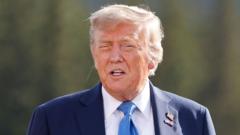Did Trump Just Seal Key Parts of the UK-US Tariff Deal?

Understanding the Impact of Tariff Reductions on UK Cars and US-UK Trade Relations
The recent signing of documents by US President Donald Trump to reduce tariffs on UK cars marks a significant moment in the trade relationship between the United States and the United Kingdom. This move, announced during the G7 summit in Canada by Prime Minister Sir Keir Starmer, has been hailed as a "very important day" for both nations. It reflects a broader effort to strengthen economic ties and create a favorable environment for trade, especially following a series of tariffs imposed on various goods entering America. However, while the reduction is a step forward, a 10% levy still lingers on most goods from the UK. This article explores the implications of these tariff changes, the context behind them, and what they mean for businesses and consumers alike.
The Context of Tariff Reductions
Tariffs are essentially taxes imposed on imported goods, designed to protect domestic industries by making foreign products more expensive. The recent tariff agreement between the US and the UK is significant as it represents the first formal announcement from the White House since the introduction of tariffs on a range of goods earlier in the year. Such measures were part of a broader strategy aimed at recalibrating trade balances and addressing perceived unfair trading practices.
During the G7 summit, Prime Minister Sir Keir Starmer emphasized the importance of this agreement in fostering closer economic ties. The reduction in tariffs on UK cars is particularly noteworthy, as the automotive industry plays a vital role in the UK economy. This sector not only contributes substantially to GDP but also provides employment to thousands of individuals across the country.
What Does the Tariff Reduction Mean for UK Cars?
The reduction of tariffs on UK cars can have multiple implications:
- Increased Competitiveness: Lower tariffs can make UK-made vehicles more competitive in the US market, potentially leading to increased sales and market share for UK manufacturers.
- Consumer Benefits: With reduced tariffs, consumers in the US may benefit from lower prices on UK cars, making them more appealing options for American buyers.
- Strengthened Automotive Relations: This agreement can pave the way for further collaboration and investment between UK and US automotive manufacturers.
- Potential for Future Agreements: This initial reduction could signal a willingness from both governments to negotiate more comprehensive trade agreements in the future.
The Remaining 10% Levy on UK Goods
While the reduction in tariffs on UK cars is a welcome development, the lingering 10% levy on most goods from the UK remains a point of concern. This tariff could dampen the positive effects of the car tariff reduction in several ways:
- Disincentive for Importers: The existing levy may discourage US importers from considering UK products, as the overall cost remains high.
- Impact on Other Sectors: Many other sectors, including textiles, machinery, and food products, will still face the burden of the 10% tariff, limiting potential growth.
- Economic Uncertainty: The uncertainty surrounding trade relations can make businesses hesitant to invest or expand operations, affecting economic growth on both sides of the Atlantic.
Broader Implications for US-UK Trade Relations
The recent tariff reductions on UK cars are just one element of a larger trade narrative between the US and the UK. Both countries have a long history of economic cooperation, but shifts in political landscapes have introduced complexities that impact trade agreements.
Potential for Future Trade Agreements
The current tariff reduction could open the door for more comprehensive trade discussions between the two nations. As both governments seek to bolster economic growth in the wake of the pandemic and other global challenges, exploring additional trade agreements may become a priority. Some potential areas for collaboration include:
- Technology and Innovation: Collaboration in tech sectors can lead to advancements that benefit both economies.
- Healthcare and Pharmaceuticals: Trade in healthcare products and pharmaceuticals could be expanded, benefiting consumers and businesses alike.
- Agriculture and Food Products: Addressing tariffs on food and agricultural products could foster stronger ties in these critical sectors.
The Role of Global Economic Conditions
As both countries navigate the complexities of their economic relationship, global market conditions will also play a significant role. Factors such as supply chain disruptions, inflationary pressures, and geopolitical tensions can all influence trade dynamics.
For instance, the ongoing impact of the COVID-19 pandemic has reshaped supply chains worldwide, leading to increased costs and delays. This scenario emphasizes the need for flexible and adaptive trade strategies that can respond to unexpected challenges. Moreover, geopolitical tensions, such as those arising from trade disputes with other nations, can further complicate the trade landscape.
Conclusion
The recent signing of tariff reductions on UK cars represents a pivotal moment in US-UK trade relations. While this move is a step in the right direction, the lingering 10% levy on most goods from the UK underscores the complexities that remain. As both nations work towards reinforcing their economic ties, the potential for future agreements and collaborations is promising. The automotive sector, along with other industries, stands to benefit from these changes, but careful navigation of global economic conditions will be essential for sustained growth.
As the world watches how these trade dynamics unfold, one thing remains clear: the relationship between the US and the UK will continue to evolve, presenting both challenges and opportunities for businesses and consumers alike. Are we on the verge of a new era in international trade, or will uncertainty continue to shape these relationships?
FAQs
What are tariffs and how do they affect international trade?
Tariffs are taxes imposed on imported goods, designed to protect domestic industries. They can lead to higher prices for consumers and affect trade balances between countries.
How do reduced tariffs impact consumers?
Reduced tariffs can lower prices for imported goods, making them more affordable for consumers and providing a greater variety of products in the market.
What other sectors could benefit from future trade agreements between the US and UK?
Potential sectors include technology, healthcare, agriculture, and pharmaceuticals, where collaboration can lead to mutual benefits and economic growth.
How do you think the ongoing trade tensions will influence future agreements between the US and the UK? #TradeRelations #TariffReduction #USUKPartnership
Published: 2025-06-16 21:28:03 | Category: technology



